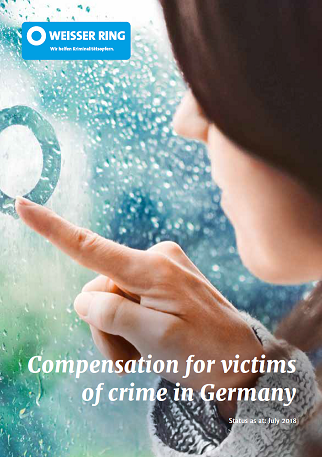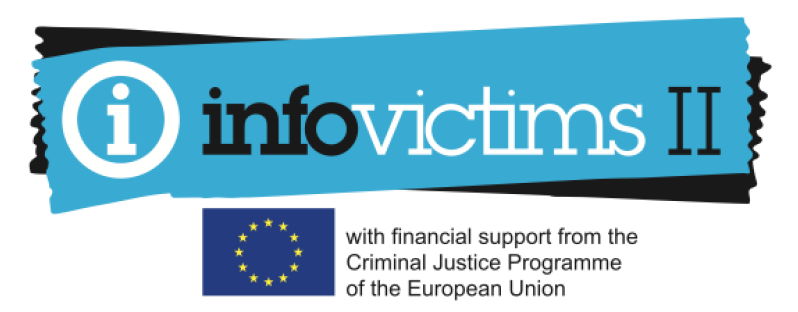WEISSER RING is the only nationwide active victim support organisation in Germany. We are independent from state funding and we are committed to help victims of crime.
overview of content
WEISSER RING provides help in the following ways, amongst others
- Support and personal counselling for victims
- Accompanying the victim to court
- Assistance in dealing with paperwork and other official matters
- Arranging for assistance from other organisations
- Issuing assistance checks by (amongst other measures) paying the victim’s fee for an initial visit to an attorney of the victim’s choice
- by assuming the cost of an initial trauma counselling session in the case of emotional burdens arising from the criminal act
- by assuming the cost of a legal medical investigation
- Assuming the cost of additional attorney fees, particularly via the following measures
- helping the victim to assert his/her statutory social claims to government assistance in accordance with (amongst other laws) crime victim’s compensation act (Opferentschädigungsgesetz/OEG)
- protecting the victim’s right during criminal proceedings (victim’s attorney)
How to find your local WEISSER RING support worker
You can find your local WEISSER RING support worker online by entering your zip-code (PLZ) in the form here. You will be directed to a victim support worker near you. We will even try to find someone speaking a language you understand.
Online Counselling
You or a close person to you is affected by a crime? You witnessed a crime? The online counselling of WEISSER RING can support you! It is anonymous and free. All data is stored encrypted on an external server and kept absolutely confidential. Please note: You will usually receive a personal response to your first request within 72 hours.
The following link will guide you to the online counselling.
If you need help immediately, please contact one of our more than 400 branch offices or our free and nationwide victims helpline at 116 006.
How to find victim support services in other countries: If you are looking for victim support services in other countries you will probably find this link helpful.
Who we are
WEISSER RING is the only nationwide active victim support organisation in Germany. Our volunteers work in accordance to these professional standards.
The victim support provided by WEISSER RING is based on the idea of offering free help to victims of crime. The victim support workers provide one-to-one assistance in a voluntary and professional capacity. They have diverse life and work experience and are trained to act as contact person and guide so as to recognise each victim’s situation and provide suitable assistance.
Our civic engagement helps victims of crime to rebuild their lives after being victimized. We also cooperate with other full-time and voluntary organisations and partners in a constructive network. We are independent from state funding and we are committed to help victims of crime. The help offered by WEISSER RING is free of charge and is guaranteed for everyone, including non-members. Our victim support workers work on voluntary basis. They do not allow themselves any personal benefits for their work.
How we are organised
3.000
VOLUNTEERS
Professionally trained volunteers are engaged in helping victims of crime.
40.000
MEMBERS
support WEISSER RING with a monthly membership fee of (at least) 2,50 Euro.
400
LOCAL BRANCHES
WEISSER RING maintains approximately 400 local branches in Germany for victims of crime.
Who we help
We help all victims of offences if evidence of a criminal offence seems sufficiently plausible.
Help is provided regardless of whether a charge is brought or a perpetrator is convicted. We also help relatives and those persons close to the victim as well as emergency helpers and witnesses of the crime. We help people living in Germany, even if they fall victim to a crime abroad.
The variety of skills and experience that our victim support workers bring along as well as their flexibility in terms of time make it possible to find the right victim support worker in each case. If the victims are family members or friends of the victim support worker, other victim support workers will be entrusted with the task of helping, thus avoiding possible conflicts of interest.
Silvia Niedermeier
HELPING VICTIMS OF CRIME SINCE 1996
„Helping people is my passion. Receiving their thankfulness is reward enough.“

Become a member, too!
How we help
We stand behind the victims. We respect each person in his/her situation as a victim, and accept his/her decisions without judging.
Our approach and understanding are a source of strength for those who have fallen victim to a crime. Each victim can trust us not to disclose confidential information to third parties. However, in criminal proceedings victim support workers are not entitled to withhold evidence in court or from the prosecution. We publicize our rendered support amongst our network partners and at the initial contact points.
„We offer active help and stand side by side each victim of a crime for as long as we are needed.“
We accept the person affected in his respective situation and lifestyle. We support the victim on his way and point out possibilities of self-help, while respecting their freedom of choice.
What we can do for you
In a personal conversation with the victim, we show possible solutions to help in each specific case. We offer immediate financial aid and assistance cheques to directly and efficiently handle crime-related emergencies.
Support Network Guides
Our support system is based on key priorities: personal support, human assistance, care and sympathy. In a confidential talk, we get to know the needs of the victims. We show victims the different ways in which they can receive support, whilst helping them to reach the right decisions. We refer them to other service providers and help them to deal with the authorities.
Our self-image: we guide and accompany victims through the support network.
Help in the case of Material Distress
We help to overcome financial emergencies that have arisen due to the offence. We also offer stop-gap assistance when authorities do not provide public-sector services promptly enough. We are not able to render assistance in the form of damages and compensation for pain and suffering.
By issuing assistance cheques we make it possible to quickly and directly contact specialists such as lawyers, therapists traumatologists and forensic doctors.

“We are familiar with the various types of offences and their consequences”
BIANCA BIWER
MANAGING BOARD
Quality of work
We are familiar with the various types of offences and their consequences, and we are aware of how differently people react to pressure they are subject to. We know of the particular consequences and problems involved for example by domestic violence, stalking and child abuse.
We know how to deal with the stressful impact of criminal offences, the kind of problems they cause, and which type of help can be offered
We have experience of the time frames in which psychological traumas can develop and always adapt our one-to-one discussions to the particular needs of victims of a crime. We know how negative repercussions can be manifested and treat victims with respect, understanding and the attention that they need.
We work in the network and are familiar with the psychosocial, psychotherapeutic and medical support structures in place.
We know therapists who are trained in traumatology and are qualified to offer therapy which is adapted to each victim’s specific situation. We know which doctors and clinics can be contacted for which diseases.
The help and the support are in accordance to the individual need of the victims. We provide material assistance as quickly as possible, taking into account how urgently the help is required.
Victims of crime may reach WEISSER RING by contacting the branch office or calling the victim helpline. We inform victims of the support which we offer, making it easier for them to claim help. All offices contacted ensure that victims are provided with support and are referred to the appropriate case worker immediately. In general, we follow up each victim’s request for help within 24 hours.
We talk to victims confidentially on the phone or in person. We also provide an anonymous support service if desired. We offer a visiting service, for which there are no time or place restrictions. The victim chooses where and when to meet up.
In an emergency situation, we are able to provide immediate assistance at the first visit. In general, we decide on additional concrete assistance within three weeks or establish contact within this time frame to clarify details as necessary. If the situation is particularly urgent, we ensure that we reach a decision within three days.
We are familiar with the rules of communication and counselling techniques in particular situations. We are qualified to communicate with victims of crime and all those involved in the discussion. We also aim to enforce the victims’ interests.
We know which rights victims are entitled to in criminal proceedings. We know which rights concern victims in a particular situation when dealing with the police, and which rights victims are entitled to in legal proceedings. We are aware of the possibilities of securing legal aid and being granted legal representation for financial assistance.
We know what benefits the Victims Compensation Act offers and the procedure to assert these claims successfully. We know which services can be obtained through other service providers and can point out the way to find the right ones.
We are familiar with all possible legal provisions within the “Protection against Violence Act” (“Gewaltschutzgesetz”) and can give victims information about applications and enforcing their rights.
We reflect on our own work. We maintain a balance between sympathy and distance to ensure that victims have the best possible help. We are able to detach ourselves and organise our work in such a way that the traumas and pressures which we have to deal with do not affect the quality of the assistance we offer.
Help – Counsel – Prevent
Purpose and objective of WEISSER RING:
- Instant assistance to crime victims and their families
- Public advocacy for the improvement of the legal and social situation of the damaged
- Strengthening of the prevention thought
- Support of reparation and offender-victim mediation projects

Quality management
The voluntary and professional staff identify themselves with the goals of the association and commit themselves to loyalty and solidarity.
We support one another to provide victims of crime with the best possible help and to create an atmosphere of trust and co-operation. We support and advise each other, and help to strengthen our skills.
For our work to be of a high standard, it is essential that we have a careful selection process to recruit our voluntary victim support workers. The branch office leaders and regional chairmen/chairwomen ensure that workers are personally suited to the work, have adequate organisation skills, and are socially integrated. This involves taking into account the variety of our work and ensuring that victims’ diverse needs are met by a range of supporters. Each candidate’s aptitudes and eligibility are first assessed during selection interviews. A trial period involving practical experience and related discussions then helps the recruiters to see if the candidate meets the expectation of a victim support worker.
The branch office leaders ensure that our work is of a high standard by means of regular discussion and self-reflection. They have a methodological approach, for example using case discussion methods and supervision. They always ensure compliance due to our standards and framework conditions, which we continuously develop for our own protection as well as in the interests of health.
Our work is based on successful compulsory and voluntary ongoing training in order to stay abreast of the latest knowledge. The branch offices have specialist workers for specific tasks, issues, or fields of application (e.g. witness support, domestic violence, stalking, sexual abuse, etc.).
In order to fulfil the given data protection rights, we use the latest technology and regularly inform as well as guide all workers to ensure the confidentiality use of data. The same criteria also apply to our victim helpline advisors.
In order to continue developing our support service and effectively disseminate and implement our objectives, we collaborate with other organisations and establishments on the basis of mutual trust, acceptance and appreciation, and we partake in political and social processes.

The right of being recognised and respected. – Know your rights!
Know your rights!
A person can fall victim to different types of crimes. Someone might, for example, steal from you, harass you, threaten you with violence, blackmail you, break into your house or destroy your property. Someone could injure or sexually abuse you.
In the past, the victim of a crime played a very minor role in criminal proceedings – the victim’s only relevance was to provide evidence. This has changed markedly during the last decades. The change was driven in large part by the lobbying of many victim support organisations, but also by the research (victimology), which investigated demands and needs of victims. The German Code of Criminal Procedure (StPO) now provides for a range of victims’ rights and enables victims to play a larger role in criminal proceedings. Today, victim rights are considered human rights.
Being involved in criminal proceedings comes with a certain amount of stress, and feeling anxious and insecure is perfectly normal. As a victim or witness of a crime, you want to know what to expect and how to behave. At https://www.infovictims.de we provide an overview of the German criminal proceedings, the parties involved and about your rights. Informed victims are powerful. Know your rights!
Press release WEISSER RING 5 December 2019

Victims' rights strengthened: new social compensation law passed
The longstanding struggle for the improvement of victims’ rights has found a positive conclusion: The German Federal Council passed Social Code Book (SGB XIV) on 5 December 2019, which will reorganise the right to compensation for victims of violence and terror. Earlier, the Bundestag had already approved the draft with a large majority at the beginning of November 2019. “We very much welcome the fact that victims of violence and terror will receive appropriate benefits in the future”, said Jörg Ziercke, Honorary Federal Chairman of the WEISSER RING. “It is gratifying to see that there is a broad social consensus that the state must provide for those affected. It cannot prevent all acts, but it can acknowledge the suffering of the victims and provide them with appropriate support and compensation. That finds now expression in the new Social Code Book (SGB XIV)”, said Ziercke.
The WEISSER RING has been intensively involved in the legislative process for months. And indeed, the now passed SGB XIV contains some decisive improvements for victims of violence and terror, which the WEISSER RING expressly welcomes. In the future, the consequences of attacks with a motor vehicle can be compensated. Serious psychological violence will also entitle to benefits. In addition, foreign nationals receive the same benefits as Germans would receive. In addition, the law contains facilitations of evidence that make access to benefits possible in the first place. It also meets core requirements of the WEISSER RING such as the preservation of participation in working life, the preservation of compensation for loss of occupational income, continued unrestricted medical treatment for injured parties and full benefits in cases of shock damage.
After an initial discussion at the Bundesrat, the federal states had also introduced further improvements for affected persons. These include an increase from 15 to 18 hours of sessions for children and adolescents in trauma clinics. “Now all parties involved must ensure that these good regulations of SGB XIV are precisely implemented, even if large parts of the law will not come into force until 2024. This also includes ensuring rapid assistance to victims. We know from practical experience that it often takes far too long for victims to receive compensation”, emphasised Ziercke.
Support Us
Every Euro counts
That is why there is no minimum donation amount. You can decide for yourself how much you want to give. With your generous donation you enable us to help victims of crime.

